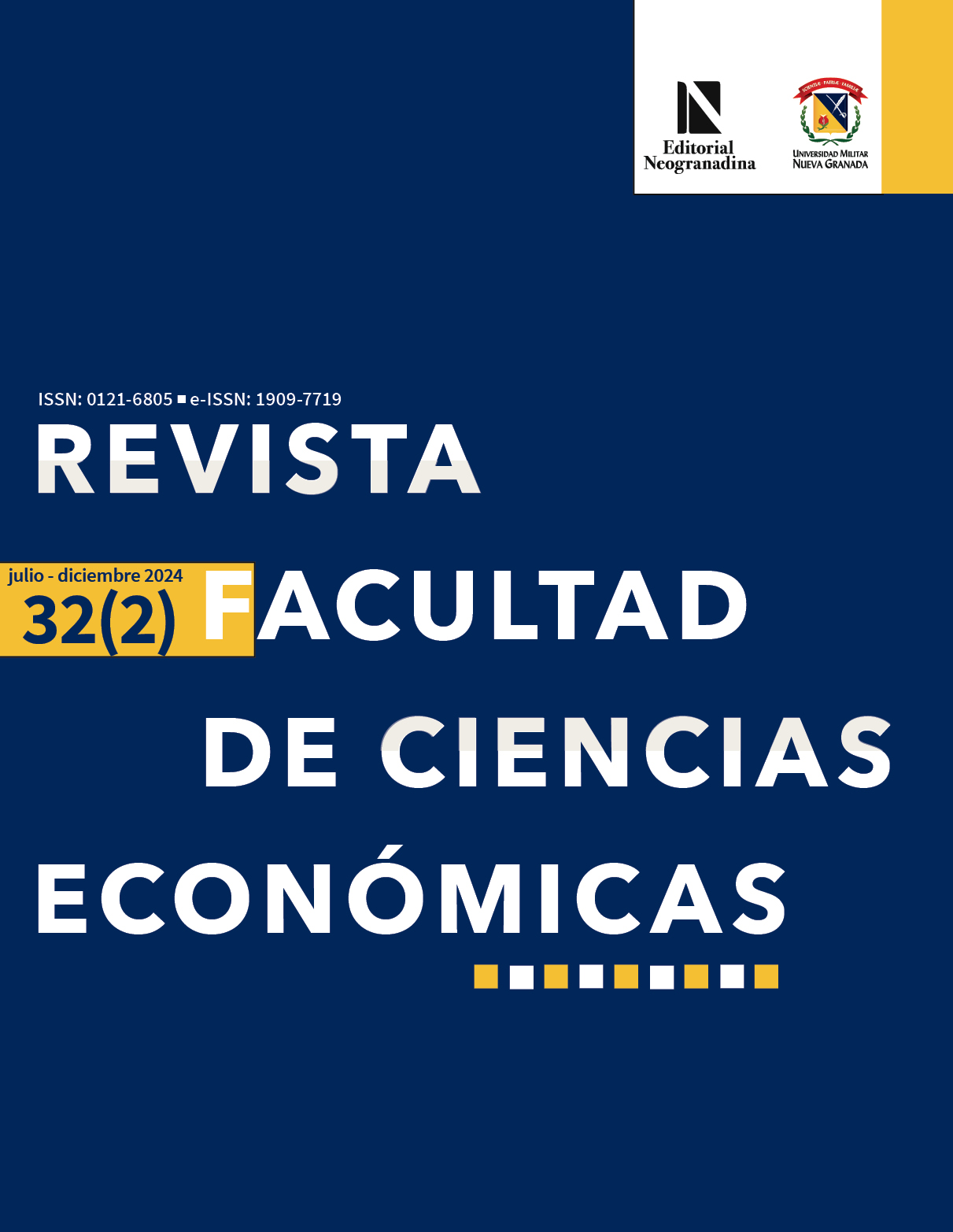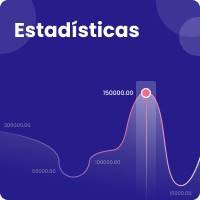Análisis de la relación entre corrupción gubernamental y satisfacción con la vida en América Latina
Resumen
El bienestar es uno de los principales objetos de estudio de la Economía, y la satisfacción con la vida se utiliza frecuentemente como indicador para medirlo. La satisfacción con la vida está influida por diversos factores socioeconómicos, incluida la percepción de corrupción. En este contexto, la relación entre la percepción de corrupción y el nivel de bienestar autorreportado no es un consenso en la literatura empírica, especialmente en América Latina. Por ello, este estudio tiene como objetivo investigar la relación entre la percepción de corrupción gubernamental y la satisfacción con la vida en la región. Para ello, a partir de datos de la organización no gubernamental Latinobarómetro referentes al año 2018, se estimaron modelos Probit Ordenado. Los resultados sugieren la existencia de una relación inversa entre niveles más elevados de corrupción gubernamental percibidos por la población y la satisfacción con la vida. Además, mediante la inclusión de interacciones entre percepción de corrupción gubernamental y clases de ingresos, raza y género, se pudo identificar que hombres blancos y asiáticos, pertenecientes a clases de ingresos bajos y muy bajos, y que poseen una mayor percepción de corrupción por parte de los gobiernos tienden a reportar un menor nivel de satisfacción con la vida. A partir de estos resultados, las políticas públicas que sean eficaces en la lucha contra la corrupción pueden elevar el nivel de bienestar y contribuir al proceso de desarrollo económico latinoamericano.
Descargas
Referencias bibliográficas
Acaravachi, A.; Artan, S.; Hayaloglu, P.; Erdogan, S. (2023) Economic and Institutional Determinants of Corruption: The Case of Developed and Developing Countries. Journal of Economics and Finance, 47(1), 207-231, New York. https://doi.org/10.1007/s12197-022-09595-7
Agarwal, R.; Mehrotra, A.; Misra, D. (2022) Customer happiness as a function of perceived loyalty program benefits-A quantile regression approach. Journal of Retailing and Consumer Services, v. 64, p. 102770, New York.https://doi.org/10.1016/j.jretconser.2021.102770
Altindag, D.; Xu, J. (2017) Life Satisfaction and Preferences over Economic Growth and Institutional Quality. Journal Labor Research, 38, 100-121, New York. https://doi.org/10.1007/s12122-016-9235-2
Amini, C.; Douarin, E. (2020) Corruption and Life Satisfaction in Transition: Is Corruption a Social Norm in Eastern Europe? Social Indicators Research, 151, 723-766. New York, DOI: https://doi.org/10.1007/s11205-020-02389-6
Apergis, N.; Dincer, O.; Payne, J. (2010) The relationship between corruption and income inequality in U.S. states: evidence from a panel cointegration and error correction model. Public Choice 145, 125-135, New York. DOI: https://doi. org/10.1007/s11127-009-9557-1
Arvin, M.; Lew, B. (2014) Does income matter in the happiness-corruption relationship? Journal of Economic Studies, v. 41, n. 3, p. 469-490.https://doi.org/10.1108/JES-02-2013-0024
Bartlett, W.; Cipusheva, H.; Nikolov, M.; Shukarov, M. (2010) The quality of life and regional development in FYR Macedonia. Croatian Economic Survey, (12),121-162, Zagreb. URL: https://hrcak.srce.hr/52493
Ben Ali, M. S.; Sassi, S. (2016) The corruption-inflation nexus: evidence from developed and developing countries. The B.E. Journal of Macroeconomics, vol. 16, no. 1, pp. 125-144. https://doi.org/10.1515/bejm-2014-0080
Bezerra, A. R. et al. (2014) Efeitos de crescimento e bem-estar da recomposição dos investimentos públicos no Brasil. Pesquisa e planejamento econômico, v. 44, n.3, dez. URL: https://repositorio.ipea.gov.br/handle/11058/3651
Bing, Y.; Bo, W. (2020) Income inequality, corruption and subjective well-being. Applied Economics, v. 52, n. 12, p. 1311- 1326.https://doi.org/10.1080/00036846.2019.1661953
Blanchflower, D. G. (2021) Is happiness U-shaped everywhere? Age and subjective well-being in 145 countries. Journal of Population Economics, v. 34, p. 575-624, Maastricht, Netherlands. https://doi.org/10.1007/s00148-020-00797-z
Campos, F. A. O.; Pereira, R. A. (2016) Corrupção e ineficiência no Brasil: uma análise de equilíbrio geral. Estudos Econômicos, v. 46, p. 373-408, São Paulo. https://doi.org/10.1590/0101-416146244rpf
Ciziceno, M.; Travaglino, G. (2019) Perceived Corruption and Individuals' Life Satisfaction: The Mediating Role of Institutional Trust. Social Indicators Research, 141, 685-701 https://doi.org/10.1007/s11205-018-1850-2
Cummings, J. Assessing U.S. (2020) Racial and Gender Differences in Happiness, 1972-2016: An Intersectional Approach. Journal of Happiness Studies 21, 709-732 https://doi.org/10.1007/s10902-019-00103-z
Di Tella, R.; Nopo, H. Macculloch, R. (2008) Happiness and Beliefs in Criminal Environments. Inter-American Development Bank Working Paper No. 554, Washington. https://doi.org/10.2139/ssrn.1821905
Domingos, V. M. A. (2018) Modelos de rating: construção e aplicação de Probit ordenado para atribuição de notações financeiras. Dissertação de Mestrado em Economia - Instituto Superior de Economia e Gestão, Universidade de Lisboa, Lisboa. URL: http://hdl.handle.net/10400.5/17655
Ferraz, R. B.; Tavares, H.; Zilberman, M. (2007) Felicidade: uma revisão. Archives of Clinical Psychiatry, v. 34, p. 234-242. São Paulo. https://doi.org/10.1590/S0101-60832007000500005
Gang, C.; Shu, L. (2013) Control, Corruption and Happiness-Empirical Evidence from CGSS 2006. World Economic Papers, v. 4, p. 37-58, Shanghai. URL: http://sjjjwh.magtech.com.cn/CN/Y2013/V01/I04/37
Gaparov, I. (2022) The Concept of Utility: The Role of Utilitarianism in Formation of a Technological Worldview. In: Bylieva, D., Nordmann, A. (eds) Technology, Innovation and Creativity in Digital Society. Lecture Notes in Networks and Systems, vol 345. Cham: Springer. https://doi.org/10.1007/978-3-030-89708-6_12
Golgher, A. B. (2014) The influence of attitudes and beliefs onthe determinants of happiness in Brazil. LGHER, A. The influence of attitudes and beliefs on the determinants of happiness in Brazil. Cedeplar/UFMG, Belo Horizonte. (Texto para discussão, n. 509). URL: https://www.academia.edu/67426266/
Golgher, A. B.; Coutinho, R. Z. (2020) Life satisfaction in Brazil: an exploration of theoretical correlates and age, period and cohort variations using the World Values Survey (1991-2014). Revista Brasileira de Estudo de População, v.37, 1-27, e0108. https://doi.org/10.20947/s0102-3098a0108
Graham, C. (2011) Adaptation amidst Prosperity and Adversity: Insights from Happiness Studies from around the World, The World Bank Research Observer, Volume 26, Issue 1, Pages 105-137.
https://doi.org/10.1093/wbro/lkq004
Graham, C..; Higuera, L.; Lora, E. (2011) Which health conditions cause the most unhappiness? Health Economics, v. 20, n. 12, p. 1431-1447. https://doi.org/10.1002/hec.1682
Graham, C.; Chattopadhyay, S. (2013) Gender and well-being around the world. International Journal of Happiness and Development, v. 1, n. 2, p. 212-232. DOI:
https://doi.org/10.1504/IJHD.2013.055648
Helliwell, J. F. (2003) How's life? Combining individual and national variables to explain subjective well-being. Economic Modelling, Volume 20, Issue 2, Pages 331-360,
https://doi.org/10.1016/S0264-9993(02)00057-3
Helliwell, J. F.; Huang, H. (2008). "How's Your Government? International Evidence Linking Good Government and Well-Being." British Journal of Political Science, Cambridge, v. 38, p. 595-619.
https://doi.org/10.1017/S0007123408000306
Helliwell, J. F.; Huang, H. (2010) How's the job? Well-being and social capital in the workplace. Industrial & Labor Relations Review, Ithaca, v. 63, n. 2, p. 205-227. DOI: https://doi.org/10.1177/001979391006300202
Hudson, J. (2006) Institutional trust and subjective well-being across the EU. Kyklos, v. 59, n. 1, p. 43-62, Malden. https://doi.org/10.1111/j.1467-6435.2006.00319.x
Ianoni, M. (2009) Políticas públicas e Estado: o plano real. Lua Nova: Revista de Cultura e Política, São Paulo, Brasil, n. 78, p. 143-183. https://doi.org/10.1590/S0102-64452009000300009
Jackman, S. (2000) Models for ordered outcomes. Political Science C, Stanford, v. 200, p. 1-20. URL: https://www.researchgate.net/profile/Simon-Jackman/publication/255541672
Johnston, J.; Dinardo, J. (2001) Métodos Econométricos. New York: Editora McGrawHill. p.571.
Joshanloo, M.; Jovanović, V. (2020) The relationship between gender and life satisfaction: analysis across demographic groups and global regions. Archives Womens Ment Health 23, 331-338, Berlin.
https://doi.org/10.1007/s00737-019-00998-w
Kageyama, J.; Sato, K. (2021) Explaining the U-shaped life satisfaction: dissatisfaction as a driver of behavior. Journal of Bioeconomics, v. 23, n. 2, p. 179-202, New York.
https://doi.org/10.1007/s10818-020-09306-4
Kollamparambil, U. (2020) Happiness, Happiness Inequality and Income Dynamics in South Africa. Journal of Happiness Studies 21, 201-222. https://doi.org/10.1007/s10902-019-00075-0
Krasniqi, B.; Desai, S. (2016) Institutional drivers of high-growth firms: country-level evidence from 26 transition economies. Small Business Economics, v. 47, n. 4, p. 1075-1094, Dordrecht. DOI:
https://doi.org/10.1007/s11187-016-9736-7
Krys, K. (2022) Societal emotional environments and cross-cultural differences in life satisfaction: A forty-nine country study. The Journal of Positive Psychology, v. 17, n. 1, p. 117-130, Abingdon. DOI: https://doi.org/10.1080/17439760.202 0.1858332
Lee, S. et al. (2013) Interaction and marginal effects in nonlinear models: case of ordered logit and probit models. Report for the Degree of Master of Science in Statistics. The University of Texas at Austin. URL: http://hdl.handle.net/2152/22588
Li, Q.; AN, L. (2020) Corruption Takes Away Happiness: Evidence from a Cross-National Study. Journal of Happiness Studies, Dordrecht, v. 21, p. 485-504. https://doi.org/10.1007/s10902-019-00092-z
Maeda, K.; Ziegfeld, A. (2015) Socioeconomic status and corruption perceptions around the world. Research and Politics, Thousand Oaks, v. 2, n. 2, p. 1-9. DOI:
https://doi.org/10.1177/2053168015580838
Méon, P.; Weill, L. (2010) Is Corruption an Efficient Grease? World Development, Volume 38, Issue 3, Pages 244-259. https://doi.org/10.1016/j.worlddev.2009.06.004
Moiseev, N.; Mikhaylov, A.; Varyash, I.; Saqib, A. (2020) Investigating the relation of GDP per capita and corruption index. Entrepreneurship and Sustainability Issues, Vilnius, v. 8, n. 1, p. 780-794.
https://doi.org/10.9770/jesi.2020.8.1(52)
Morris, S. D.; Klesner, J. L. (2010) Corruption and trust: Theoretical considerations and evidence from Mexico. Comparative Political Studies, Thousand Oaks, v. 43, n. 10, p. 1258-1285. DOI:
https://doi.org/10.1177/0010414010369072
Moura, J. A. R. et al. (2022) Felicidade, satisfação com a vida e com a democracia no Brasil: 2017/2020. Aletheia, v. 55, n. 2. https://doi.org/10.29327/226091.55.2-9
Nguyen, G. N. T.; LIU, X. (2023) The interrelationship between corruption and the shadow economy: a perspective on FDI and institutional quality. Journal of Economics and Development, v. 25, n. 4, p. 349-364, Bingley.https://doi.org/10.1108/JED-03-2023-0044
Ott, J. (2013) Greater happiness for a greater number: Some non-controversial options for governments. The Exploration of Happiness: Present and Future Perspectives. Dordrecht: Springer. p. 321-340. https://doi.org/10.1007/978-94-007-5702-8_17
Pessoa, D. G. C.; Silva, P. L. N. (1998) Análise de dados amostrais complexos. São Paulo: Associação Brasileira de Estatística. 187 p67. URL: https://djalmapessoa.github.io/adac/bookdown-adac.pdf
Ribeiro, C. A. C. (2015) Renda, relações sociais e felicidade no Brasil. Dados, v. 58, p. 37-78. DOI:
https://doi.org/10.1590/00115258201538
Spruk, R.; Kešeljević, A. (2016) Institutional Origins of Subjective Well-Being: Estimating the Effects of Economic Freedom on National Happiness. Journal of Happiness Studies, Dordrecht, v. 17, n. 2, p. 659-712. https://doi.org/10.1007/s10902-015-9616-x
Spyromitros, E.; Panagiotidis, M. (2022) The impact of corruption on economic growth in developing countries and a comparative analysis of corruption measurement indicators. Cogent Economics & Finance, Abingdon, v. 10, n. 1, p. 1-20.https://doi.org/10.1080/23322039.2022.2129368
Sulemana, I. (2015) Do perceptions about public corruption influence subjective well-being? Evidence from Africa. Subjective well-being: Psychological predictors, social influences and economical aspects. Hauppauge. Nova Science Publishers, Columbia.
Swaleheen, M.; Ben Ali, M. S.; Temimi, A. (2019) Corruption and public spending on education and health. Applied Economics Letters, Abingdon, v. 26, n. 4, p. 321-325. URL: https://ssrn.com/abstract=3177991, https://doi.org/10.1080/13504851.2018.1468549
Sychowiec, M.; Bauhr, M.; Charron, N. (2021) Does Corruption Lead to Lower Subnational Credit Ratings? Fiscal Dependence, Market Reputation, and the Cost of Debt. Business and Politics, Cambridge, v. 23, n. 3, p. 364-382. https://doi.org/10.1017/bap.2020.22
Tavits, M. (2008) Representation, corruption, and subjective well-being. Comparative Political Studies, Thousand Oaks, v. 41, n. 12, p. 1607-1630. https://doi.org/10.1177/0010414007308537
Todaro, M. P.; Smith, S. (2020) C. Economic development. Pearson UK. URL: https://books.google.com.br/ books?hl=pt-BR&lr=&id=UeksEAAAQBAJ&oi=fnd&pg=PT22&dq=TODARO,+Michael+P.
Transparência Internacional. (2022) Índice De Percepção Da Corrupção. Disponível em: https://transparenciainternacional.org.br/ipc/ Acesso em 30 de setembro de 2023.
Uddin, I.; Rahman, K. U. (2023) Impact of corruption, unemployment, and inflation on economic growth evidence from developing countries. Quality & Quantity: International Journal of Methodology, Dordrecht, v. 57, p. 2759-2779.https://doi.org/10.1007/s11135-022-01481-y
United Nations Global Compact. (2000) Anti-Corruption. Tied to Principles. Disponível em: https://unglobalcompact.org/ Acesso em: 29 de setembro de 2023.
Organização Das Nações Unidas Contra A Droga E O Crime - UNODC. (2000) Convenção das Nações Unidas contra a Corrupção. Disponível em: https://www.unodc.org/lpo-brazil/pt/corrupcao/convencao.html Acesso em: 3 outubro de 2023.
World Bank. (2020) Doing Business 2020, Comparing Business Regulation in 190 Economies. Publisher: World Bank. Washington, DC. https://doi.org/10.1596/978-1-4648-1440-2
Wu, Y.; Zhu, J. (2016) When Are People Unhappy? Corruption Experience, Environment, and Life Satisfaction in Mainland China. Journal of Happiness Studies, Dordrecht, v. 17, p. 1125-1147. https://doi.org/10.1007/s10902-015-9635-7
Zander, T. (2021) Does corruption matter for FDI flows in the OECD? A gravity analysis. International Economics and Economic Policy, v. 18, p. 347-377, Heidelberg. DOI:
https://doi.org/10.1007/s10368-021-00496-4
Zanon, B. P. (2022) Controle da corrupção: percepção glocal da América Latina. Tensões Mundiais, Fortaleza, v. 18, n. 36, p. 91-110. URL: https://revistas.uece.br/index.php/tensoesmundiais/article/view/7910.
Zheng, W.; Liu, L.; Huang, Z. W.; Tan,.X. (2017) Life Satisfaction as a buffer of the relationship between corruption perception and political participation. Social Indicators Research, Dordrecht, v. 132, n. 2, p. 727-747. https://doi.org/10.1007/s11205-016-1318-1
Derechos de autor 2024 Revista Facultad de Ciencias Económicas

Esta obra está bajo una licencia internacional Creative Commons Atribución-NoComercial-SinDerivadas 4.0.











